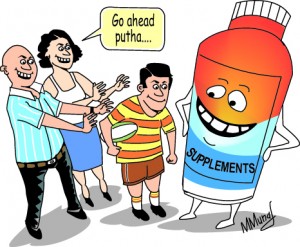Do we really need supplements to stay in the game?
View(s):The rugby season begins and a parent of a 12-year-old rugby prospect walks into a gym and wants a schedule for his son to do weight training. Doctors are asked by parents about the supplements they need to give their children. ‘Is it good or bad?’ is not easy to answer as most want the children to perform and they must do what the Joneses do. The various noises will be heard from parents and those around making an attempt to justify. The frenzy for supplements and weight training even for the young is a result of the fear that others are doing better than their own because they are “supplemented.”
A well-known medical personality once lamented that his policy of a non-supplement approach was often criticised by parents who asked if our children are mot given these helpful products how can we compete. I was surprised when I heard that the budget for supplements in a school was around Rs. 1.3 million for the year. I was shocked when others told me that this is a modest figure as some of them spend around Rs. 3 to 4 million a year. I was equally taken aback when I learnt that a person asking for a schedule for weight training for his young child was in a capacity in a group which are called advisory committees. I also learnt that most of the pushing for supplements come from members of these committees if not from parents. It is possibly because they do not know about the after effects of some of the substances. Some of these ingredients taken in the long run can have effects on the kidney including kidney stones when administered over long periods.
Strong words from the stands and aggressive behaviour have been spoken of and ill effects discussed as that is a bad example to students. Today there is a real threat from those interested in results but ignore the long range of effects by pushing playing and training through the supplement and instant formulae.
An abstract form an article by Melvin H Williams published in the Journal of the International Society of Sports Nutrition reads: “Sports success is dependent primarily on genetic endowment in athletes with morphologic, psychologic, physiologic and metabolic traits specific to performance characteristics vital to their sport. Such genetically-endowed athletes must also receive optimal training to increase physical power, enhance mental strength, and provide a mechanical advantage. However, athletes often attempt to go beyond training and use substances and techniques, often referred to as ergogenics, in attempts to gain a competitive advantage. Pharmacological agents, such as anabolic steroids and amphetamines, have been used in the past, but such practices by athletes have led to the establishment of anti-doping legislation and effective testing protocols to help deter their use. Thus, many athletes have turned to various dietary strategies, including the use of various dietary supplements (sports supplements), which they presume to be effective, safe and legal.
Researching further one finds The Australian Institute of Sports (AIS) in it Sports Supplement Programme 2012 saying, “Supplements can assist AIS athletes to achieve peak performance. However, poor regulation of the supplement industry allows athletes to be bombarded with marketing hype that exaggerates or completely invents unproven benefits arising from the use of supplements. Unfortunately, the driving force behind the supplement practices of many athletes is not sound science applied to the specific needs of a sport. Instead, some athletes are motivated by fear that their competitors might be taking supplements and that they can’t afford to miss out on any ‘performance edge’. The results of the present frenzy of supplements in sport are:
-A small but real risk of a positive ‘doping’ outcome
-Money being wasted on products that simply do not work
-Time, money and belief being distracted away from the factors that can really enhance health, recovery and performance
It is in this background that we find a laudable effort by the Sri Lanka Rugby Football Union with the Sports Medicine Unit to educate and impose some standards to make the game safe. Chula Dhamadasa the council member in charge of the project is very keen on the implementation and has the fullest support of the council. Putting in place a system and structure will not g happen overnight as the past has been to do what we were doing and that is the correct way?
The Rugby Ready handbook expects that all involved in organizing and playing rugby have a duty of care in relation to the players. The IRB Rugby Ready programme is intended to raise awareness of good practice and help stakeholders manage the inherent risks of a contact sport by putting appropriate safeguards in place. Some among the current fraternity, who will be averse to change, might say we have been doing this for over a century and pooh at the attempt.
“It must be considered that there is nothing more difficult to carry out, nor more doubtful of success, nor more dangerous to handle, than to initiate a new order of things.” – Niccolò Machiavelli.
A sample of the expectation is the stages of development during the Long Term Player Development Pathway according to the IRB I as s below.
“Stage1, Stage2, Stage3, Stage4, Stage5 Phase. FUN: DEVELOPMENT, PARTICIPATION, PREPARATION, PERFROMANCE Age Guide 6-12, 12-16, 15-18, 17-21 and 20 And Over. Player Plays, Explores, Focuses, Specialises, Innovates. Coach Guides, Teaches, Challenges, Facilitates, Empowers.
Content: Learn To Move and Basic Rugby Skills, Learning The Game, Playing The Game, Developing The Player, Reaching Full Potential, Consistency Of Performance.”
Following a structure will ensure rugby being a sport for all and one proud of its values and which remains true to them. The game’s core values are: Integrity, Passion, Solidarity, Discipline and Respect. If you continue on the background that we spend so much and most of it is wasted as specialists claim, then there will be more chaos, vilification and invasion of the playing area.
Vimal Perera is a former Rugby Referee, coach and Accredited Referees Evaluator IRB
Follow @timesonlinelk
comments powered by Disqus
















